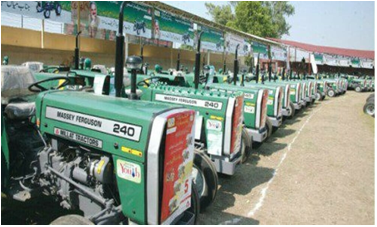i INP-WEALTHPK
Azeem Ahmed Khan
Pakistan’s tractor manufacturing industry has expanded steadily over the past decade, with several new players entering the market. However, inconsistent government policies, inflationary pressures, and high financing rates continue to pose serious challenges to its sustainable growth, according to a spokesman of the Pakistan Automotive Manufacturers Association (PAMA).

Talking to Wealth Pakistan, the spokesman said that the industry has witnessed growth with the entry of new manufacturers such as ATS, Buraq, and Guard World. However, overall sales have remained volatile due to frequent changes in tax policies, fluctuating import duties, and unpredictable government interventions, including short-term subsidy schemes and regulatory shifts.
He said Pakistan’s cumulative tractor production capacity currently stands at around 80,000 units per year. Rising input costs, driven by persistent inflation and sharp currency devaluation, have significantly increased the prices of imported parts, while recent floods and elevated financing rates have reduced farmers’ purchasing power, squeezing overall demand and putting pressure on local manufacturing.
The spokesman pointed out that frequent changes in sales tax rates, from 10 percent to 5 percent, then to zero, and abruptly to 14 percent, have further raised tractor prices and weakened sales. “A consistent sales tax regime is essential for stable growth of the tractor industry,” he stressed. He added that the complex GST refund process ties up manufacturers’ working capital, and unpredictable policy shifts create uncertainty that disrupts production schedules and discourages long-term investment planning.
According to him, small and subsistence farmers remain unable to afford tractors due to high upfront costs, relying instead on rental services for cultivation. “The government’s Green Tractor Scheme, which provides subsidized tractors, is confined to Punjab and distributed through a balloting system. This limits its reach and excludes many eligible farmers in other provinces,” he said.
The limited implementation of the scheme, he noted, has reduced its overall impact on farm mechanization at the national level, created regional imbalances, and disrupted industry planning. “Instead of fixed quotas under the Green Tractor Scheme, a general subsidy of 10 to 20 percent should be offered to all eligible farmers to ensure fairness and consistency,” he suggested.
The spokesman said that while financing options exist, high interest rates remain a major obstacle. “Millat Tractors, for example, partners with Bank Alfalah and Bank of Khyber to offer discounted prices and KIBOR-linked loans, with markups ranging between KIBOR −0.05% and KIBOR +2%. Government financing is currently offered at 7%, which is still high for small farmers—especially compared to India’s 0% financing,” he explained.
Despite domestic hurdles, Pakistani tractors have begun to find overseas markets. Millat Tractors exported around 2,600 units during 2024–25, with major buyers in Afghanistan and African countries such as Tanzania, Kenya, Nigeria, and Madagascar. With about 90 percent local content, Pakistani tractors are competitively priced and attract buyers in price-sensitive markets, though they face tough competition from Indian and Chinese brands in terms of technology and after-sales service.
He emphasized that tractors are vital for modern agriculture, enabling farmers to cultivate larger areas efficiently and adopt mechanized practices that boost productivity. “Increased tractor availability accelerates land preparation, sowing, and harvesting, leading to timely crop cycles, higher yields, and reduced labour costs,” he said.
The spokesman urged the government to introduce stable and transparent policies to ensure sustained growth in the sector. “A consistent sales tax regime, a broad-based and fair subsidy structure, and reduced financing rates—ideally to around 3.5 percent through banking channels—would greatly encourage investment in farm machinery,” he said. “Allocations should be based on clear eligibility criteria rather than balloting, so that support reaches genuine farmers.”
Credit: INP-WealthPk









